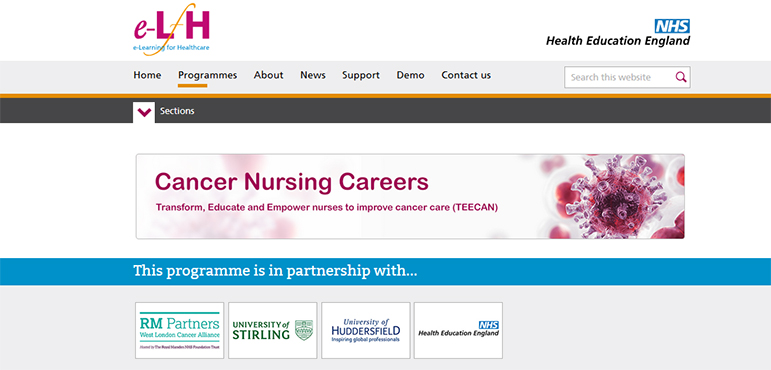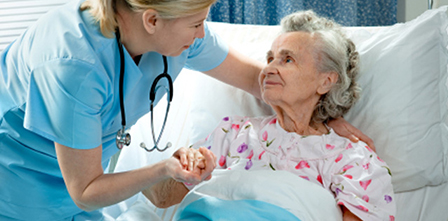“…cancer affects one in every two people, however, there is wide variability in an individual nurse’s knowledge, skills and competencies related to cancer…”
AN innovative e-learning programme developed by experts at the University of Huddersfield and University of Stirling will educate and empower nurses to improve cancer care.
The Cancer Nursing Careers programme will provide learning opportunities for nurses who provide care to people affected by the disease in non-specialist cancer settings – including in primary, secondary and community care.
Study Nursing at Huddersfield
The programme content was developed by Dr Vanessa Taylor of the University of Huddersfield and Dr Susanne Cruickshank and Professor Jayne Donaldson of the Faculty of Health Sciences and Sport at Stirling. They worked on the TEECAN project (Transform, educate and empower nurses to improve cancer care) in partnership with RM Partners, the West London Cancer Alliance hosted by The Royal Marsden NHS Foundation Trust and Health Education England.
Dr Taylor and Dr Cruickshank said: “Nurses make up 43 per cent of the NHS workforce and meet, treat, support and care for people at many stages during the cancer pathway, and in multiple settings.
“Cancer affects one in every two people, however, there is wide variability in an individual nurse’s knowledge, skills and competencies related to cancer. It is important that health professionals feel confident talking to and supporting those affected by cancer.
“The Cancer Nursing Careers programme is an excellent resource for nurses and will help to ensure that nurses – regardless of the setting in which they work – have the necessary knowledge and skills to provide appropriate care to those affected by cancer.”
Clarity around cancer
The programme was developed from eight outcomes outlined in the Royal College of Nursing Career and Education Framework for Cancer Nursing, published in 2017. The framework, for which Dr Taylor was Chair of the Steering Group and Lead Author, was written to provide clarity around cancer specific nursing outcomes and the minimum standards of theoretical and practice requirements necessary to provide excellent, safe, effective and timely cancer care.
It also highlights four cancer cases studies to illustrate understanding of risk of developing cancer, treating cancer and providing excellent care to people affected by cancer.
Reflecting on the impact of the COVID-19 pandemic on cancer services, Dr Taylor and Dr Cruickshank added: “The current situation has directly impacted cancer services and it is important that they return to normal as quickly and as safely as possible. Nurses can prepare by undertaking cancer-specific learning, such as the Cancer Nursing Careers programme.”
- The e-learning resource, funded by a grant from Health Education England, is available on Health Education England’s e-Learning for Healthcare Hub website and is available free of charge to nurses, and other health and care professionals, across the UK.
Biofilm early detection advance chronic wound care
Microscopic biofilms go undetected by health professionals damaging healing tissue and causing delays in wound healing
COVID-19 survivor praises student nurse
COVID survivor appears on TV show “Good Morning Britain” where she thanked Huddersfield nursing student Emily Donaghy
Midwife’s morale high despite virus constraints
Student midwife Kirsty Roebuck and her maternity unit colleagues are working even harder to ensure mum and baby are healthy and happy


